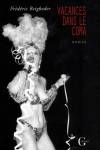Auteurs contemporains
Discours critique sur les œuvres de littérature contemporaine
Outils pour utilisateurs
Outils du site
Vacances dans le coma
Frédéric Beigbeder - Paris, Grasset, 1994, 238 p.
« Une nuit dans la vie d’un somnambule. Le héros, un jeune homme dans le vent, se rend à l’ouverture d’une boîte de nuit place de la Madeleine, à Paris. Il avait l’illusion d’une paisible chasse à la femme. Il y découvre la monstruosité d’une fête qui sera peut-être la dernière, des voisines liftées et mortes au désir, des jeunes filles à la respiration coupée par la cocaïne, un monde qui danse pour s’étourdir. On ne dira pas la fin, qui réserve une surprise et penche tout d’un coup du côté de Jacques Chardonne. Une fin sereine… “Huis clos étant déjà pris, j’ai choisi Vacances dans le coma”, dit ironiquement l’auteur déjanté de ce roman de la nuit, qu’une longue expérience du night-clubbing alcoolisé a inspiré. » (résumé des Éditions Grasset)
Documentation critique
La QUÉRIÈRE, Yves de, « L’écume des nuits : Vacances dans le coma de Frédéric Beigbeder », dans Alain-Philippe DURAND (dir.), Frédéric Beigbeder et ses doubles, Amsterdam, Rodopi, 2008, p. 139-154. +++ Chapitre de collectif
DURAND, Alain-Philippe, « Des romanciers en faveur du non-lieu », dans Béatrice NICKEL (dir.), Die Poesie und die Künste als inszenierte Kommunikation, Tübingen, Stauffenburg, 2011, p. 73-83. +++ Chapitre de collectif
DURAND, Alain-Philippe, Un monde techno : Nouveaux espaces électroniques dans le roman français des années 1980-1990, Berlin, Weidler, 2004, 158 p. +++ Monographie
### Il s’agit de la version remaniée d’une thèse de doctorat: DURAND, Alain-Philippe, « Nouveaux espaces électroniques dans le roman français des années 1980 et 1990 », thèse de doctorat, department of Romance languages (french), University of North Carolina, 1999, 209 f. ###
DURAND, Alain-Philippe, « Nouveaux espaces électroniques dans le roman français des années 1980 et 1990 », thèse de doctorat, department of Romance languages (french), University of North Carolina, 1999, 209 f. +++ Thèse de doctorat / mémoire de maîtrise
### « This dissertation shows how a significant number of French novels from the 1980s and 1990s are linked through their reflection of a society invaded and taken over by modern electronic devices. I specifically bring together novels by Frédéric Beigbeder (Vacances dans le coma), François Bon (Sortie d’usine and Temps machine), Laurent Chalumeau (Fuck), Anne Garréta (Sphinx), Patrick Grainville (Le lien), Jean-Philippe Toussaint (La télévision), and Jean Vautrin (Symphonie grabuge); and I argue that the accumulation of technology in these works results in the apparition of new spaces that French anthropologist Marc Augé calls non-places. These are places involving the circulation and entertainment of people, such as super highways, airports, stadiums, shopping centers, or discotheques.
My main objective is to define the functioning of these non-places as they appear in the imaginary of the selected contemporary novels. I discuss that the non-places share the following characteristics. First, they are the center of extreme, over-amplified, deafening noises. This unbearable acoustic environment underlines technology’s power inside the non-places.
Second, the non-places are invaded by elements of popular culture such as commercial slogans and billboards, sound jingles, and computer jargon. In the non-places, traditional means of expressions have disappeared and have been replaced by electronic devices. Sometimes, the non-place is interpreted as a mechanical language imposed by the surrounding machines, a language that the subject cannot master.
Third, non-places constitute a global environment. All the novels analyzed for this study take place in the largest megalopolises of the world. These texts give the feeling that the Earth is a subway line with various increasingly resemblant stations named Paris, London, New York, etc.
Furthermore, the dissertation shows that electronic devices function as an independent automaton which is taking possession of both public and private spaces. Consequently, the individual, the subject, is transformed into a submissive being who has lost any notion of genetic or sexual identity. The subject of the electronic community has been changed into a concept.
Finally, the study reveals that a new self-proclaimed “Underground Naturalism” generation of novelists is appearing in France in the 1990s. » (résumé joint à la thèse)
La version PDF du mémoire est disponible pour les membres de communautés universitaires qui ont un abonnement institutionnel auprès de UMI - Proquest. ###
| Vacances dans le coma (oeuvre) | |
|---|---|
| Titre | Vacances dans le coma |
| Auteur | Frédéric Beigbeder |
| Parution | 1994 |
| Tri | Vacances dans le coma |
| Afficher | oui |
